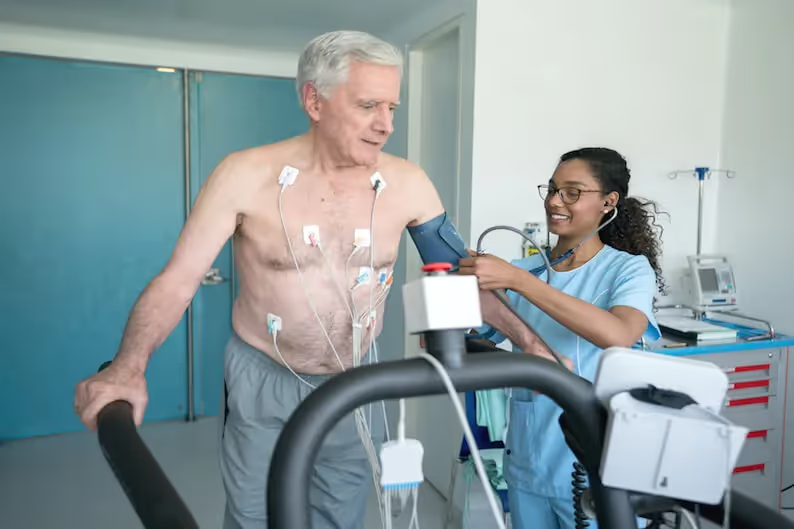Shortness of breath. Chest pressure. Fatigue during simple activities. These symptoms can sometimes be brushed off as stress or fatigue, but in older adults, they may signal something more serious.
Heart disease remains one of the most common health concerns for adults over 65. When symptoms appear, even mildly, it’s important not to ignore them. One of the most effective tools for evaluating heart health is a cardiolite stress test, also known as a nuclear stress test or myocardial perfusion imaging (MPI).
Understanding how this test works and how it benefits seniors can provide clarity and peace of mind.
What Is a Cardiolite Stress Test?
A cardiolite stress test is a non-invasive cardiac imaging test that evaluates blood flow to the heart muscle at rest and during stress (exercise or medication-induced stress).
It uses a small amount of radioactive imaging tracer and special cameras to produce detailed images of the heart. These images help physicians:
· Detect blocked or narrowed coronary arteries
· Identify heart muscle damage
· Evaluate how well the heart pumps
· Assess risk for future cardiac events
· Monitor existing heart disease
Because it shows both blood flow and heart function, a nuclear stress test provides more detailed information than a standard treadmill stress test alone.
Why Heart Stress Testing Is Especially Important After 65
As the body ages, the risk of coronary artery disease, heart failure, and other cardiovascular conditions increases. Many seniors may not experience classic symptoms of heart disease. Instead, they might notice:
· Unusual fatigue
· Mild shortness of breath
· Decreased exercise tolerance
· Lightheadedness
· Chest tightness that comes and goes
A cardiac stress test can help identify problems early — before they lead to heart attack or worsening heart damage.
Early detection often means more treatment options and better long-term outcomes.
How Is a Nuclear Stress Test Performed?
The test is completed in two main phases: rest and stress.
Resting Phase
A nurse or technician inserts an IV line into the arm and injects a small amount of radiotracer. After several minutes, images of the heart are taken while the patient lies comfortably on a table. A specialized gamma camera captures detailed pictures of blood flow to the heart muscle.
Stress Phase
Electrodes are placed on the chest to monitor heart rhythm with an electrocardiogram (ECG or EKG). Blood pressure is also closely monitored.
The heart is then “stressed” in one of two ways:
- Walking on a treadmill
- Riding a stationary bike
As the heart rate increases, a second injection of tracer is given. Additional images are taken to compare blood flow during exertion versus rest.
These side-by-side images allow physicians to determine whether blood flow is reduced in certain areas of the heart.
What If Exercise Isn’t Possible?
Many older adults have joint pain, balance concerns, or other mobility limitations. If exercise isn’t safe or comfortable, medication can be administered through the IV to safely increase blood flow and simulate exercise. This is called a pharmacologic stress test.
Some temporary sensations — such as flushing, mild shortness of breath, or a warm feeling — may occur, but they typically resolve quickly.
Benefits of a Cardiolite Stress Test
A nuclear stress test provides valuable insight into overall heart health. It can:
- Reveal blockages in coronary arteries
- Detect previous silent heart attacks
- Measure the size and strength of heart chambers
- Evaluate effectiveness of heart medications
- Guide treatment decisions
- Establish a baseline for ongoing monitoring
For seniors with known heart disease, the test helps determine severity and progression. For those without a prior diagnosis, it can identify early warning signs and assess future risk. This information allows providers to create or adjust a personalized treatment plan focused on prevention and long-term heart health.
Is a Cardiolite Stress Test Safe?
Yes. A cardiolite stress test has been safely used for decades. The amount of radiation exposure is low and considered safe for diagnostic purposes. For most seniors, the benefit of identifying serious heart conditions far outweighs the minimal risks associated with the test. As with any medical procedure, individual health conditions should be discussed with a healthcare provider beforehand.
How Long Does the Test Take?
A nuclear stress test typically takes between two and four hours. Much of that time involves waiting between imaging phases while the tracer circulates through the bloodstream. Patients are usually able to return home the same day.
When Should Seniors Talk to a Doctor About a Heart Stress Test?
A healthcare provider may recommend a cardiac stress test if symptoms such as the following are present:
- Chest pain or pressure
- Shortness of breath
- Dizziness
- Irregular heartbeat
- Unexplained fatigue
- Abnormal EKG results
- Known coronary artery disease
Even mild symptoms should not be ignored, especially in adults over 65.
Proactive Heart Care Matters
Nearly half of American adults live with some form of cardiovascular disease, and risk increases with age. Routine monitoring and timely diagnostic testing can help:
- Prevent heart attacks
- Reduce hospitalizations
- Improve quality of life
- Support independence
A cardiolite stress test can serve as both a diagnostic tool and a preventive benchmark, helping seniors and their healthcare providers make informed decisions about heart health.
If you’re experiencing symptoms such as chest discomfort, heavy breathing, or unusual fatigue, schedule an appointment with a VIPcare provider to discuss your heart screening options. Early evaluation can provide reassurance, answers, and a clear plan for maintaining long-term cardiovascular wellness.




